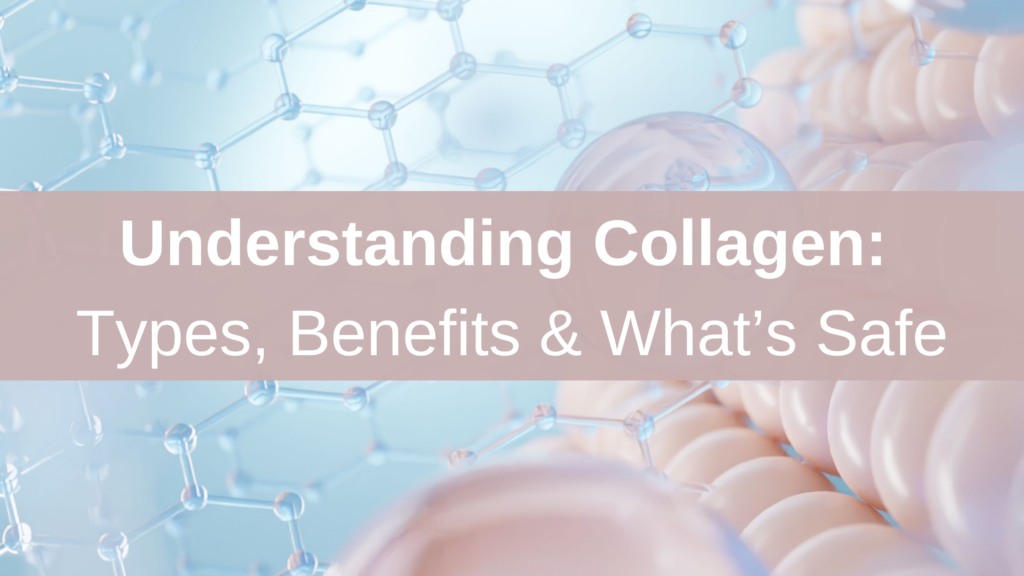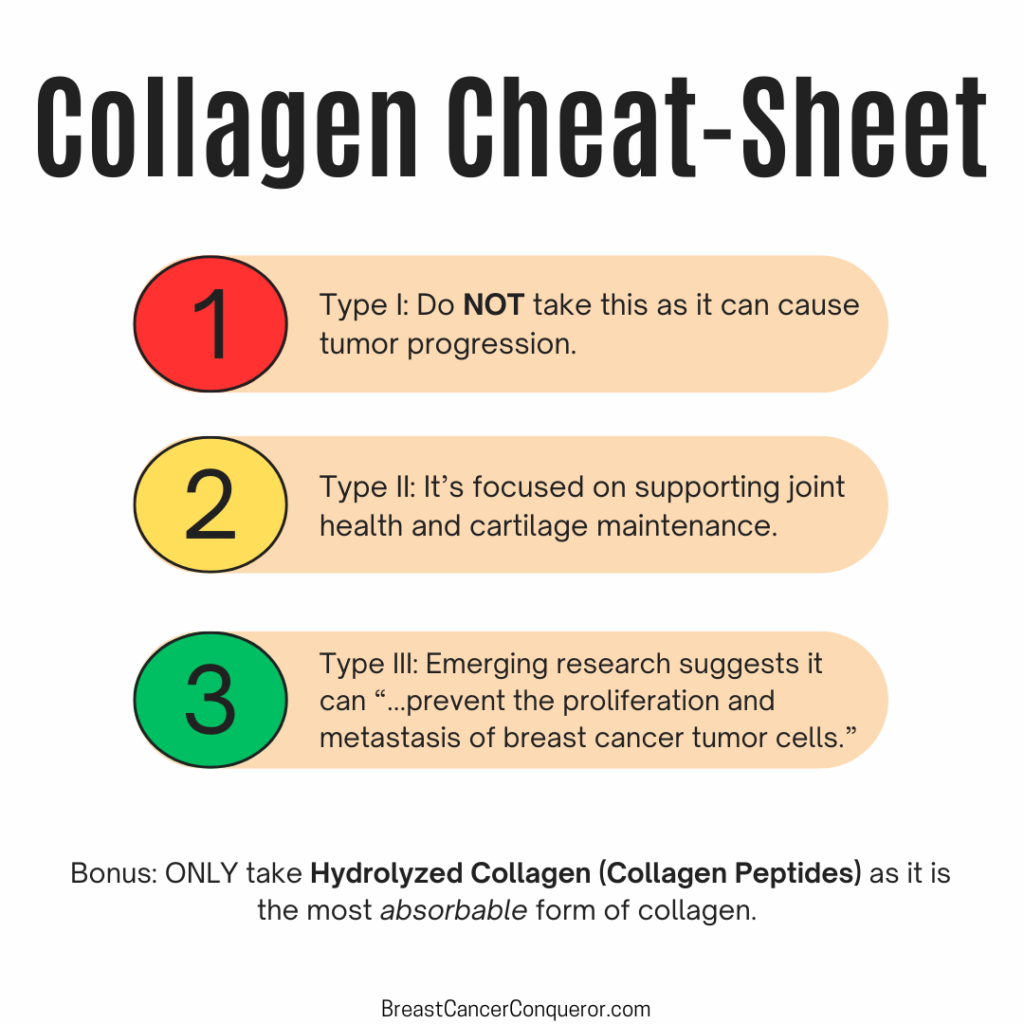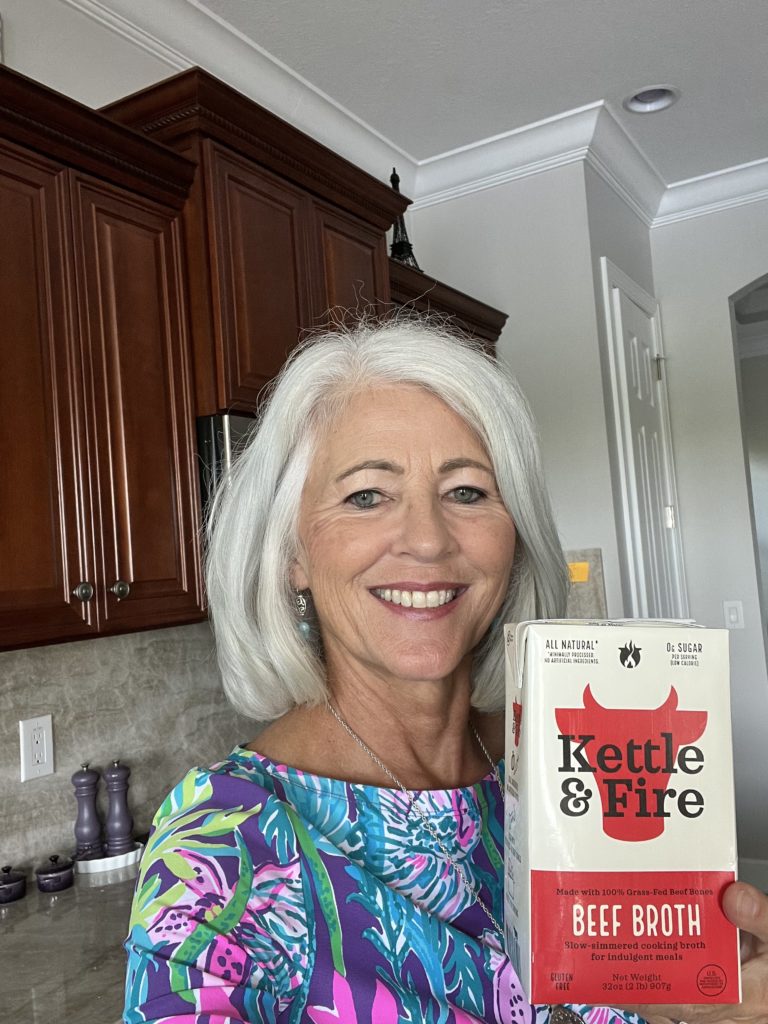
Quick Read:
- If you do use collagen, ONLY take Type 3.
- Bone broth and collagen-boosting foods are great options.
- Be cautious about the toxic additives in certain collagens; always read the back label.
For the last several years, collagen has been all the rage. Many ambitious claims have been made about its “fountain of youth” and gut health powers. However, are they accurate? Is collagen trendy hype, or is there hard science about its benefits for breast cancer healing? Find out the best types of collagen for breast cancer healing.
If these questions have been floating around in your mind, you are at the right place. We are people of evidence-based facts and solutions!
But first…what actually IS collagen?
Collagen is the most abundant protein in the human body, providing structure and strength to skin, bones, tendons, and ligaments. As we age, collagen production naturally declines, leading to signs of aging and potential health concerns.
Of course, since everyone wants to turn back the aging clock, supplementing collagen seems like the logical thing to do.
However, collagen is NOT equally made, and many different types exist. This blog dives into each and uncovers what is helpful and harmful for breast cancer healing.

Types of Collagen: What a Wellness Warrior Needs to Know
There are several types of collagen, each serving distinct functions:
Do NOT take Type I Collagen.
Comprising about 90% of the body’s collagen, Type I provides structure to skin, bones, tendons, and ligaments. While essential for structural integrity, imbalances or overproduction of Type I collagen have been linked to certain fibrotic conditions, potentially contributing to tumor progression. This 2024 study found that “Type I Collagen provides structural support to tumors, creating a scaffold that aids tumor growth. Increased collagen deposition leads to a stiffer ECM, promoting tumor cell proliferation and survival.”
Type II Collagen.
Found predominantly in elastic cartilage, Type II supports joint health. Supplements targeting joint pain and arthritis often contain Type II collagen due to its role in cartilage maintenance. (Study)
Type III Collagen.
Present in reticular fibers, Type III supports the structure of muscles, organs, and arteries. Emerging research suggests that Type III collagen influences the tumor microenvironment and promotes cell dormancy. This 2024 study found, “Type III collagen may be used as a physical barrier preventing the proliferation and metastasis of breast cancer tumor cells, and promoting apoptosis and dormancy of tumor cells.”
Hydrolyzed Collagen vs. Regular Collagen Powders
On top of the type of collagen supplements, it’s essential to understand the difference between hydrolyzed collagen and regular collagen powders. The form you consume impacts how well your body can digest, absorb, and utilize the collagen for maximum benefits.
Regular Collagen: The least absorbable form.
Regular collagen exists in its native, unprocessed form. This means it consists of long, complex protein structures naturally found in animal connective tissues. While type I retains its complete molecular structure, it is difficult for the body to break down and absorb efficiently. After all, if your body can’t absorb it, there is no point in taking it.
In the case of regular collagen, your digestive system must work harder to break these large proteins into smaller, usable peptides before they can enter the bloodstream and provide benefits. This means it is less bioavailable, meaning a smaller percentage of what you consume actually gets used by your body.
Hydrolyzed Collagen: Also known as Collagen Peptides.
Hydrolyzed collagen undergoes a specialized enzymatic process called hydrolysis, which breaks the large collagen molecules into smaller peptide chains and significantly enhances its bioavailability. Doing so allows the body to absorb it more efficiently and quickly transport it through the bloodstream and to support skin elasticity, apoptosis, joint health, gut repair, overall tissue regeneration, and so forth.
It’s also easier to consume since hydrolyzed collagen dissolves quickly in both hot and cold liquids. Meaning it pairs well with your morning coffee, dinner soup, sleepy-time tea, or other beloved drinks without affecting texture or taste.
Potential Risks of Collagen Supplements
As stated above, not all collagen is created equally. If you and your medical team decide collagen is needed in your healing journey, ensure you know exactly where it comes from.
Many collagen supplements are derived from the connective tissues, bones, and other parts of animals such as cows, pigs, chickens, and fish. If these animals were exposed to toxins or raised in non-organic environments, the collagen extracted could contain harmful substances.
Additionally, the supplement industry lacks strict regulation, leading to potential inconsistencies in product purity. For example, many could also include artificial ingredients, toxins, heavy metals, filler sugar, and other harmful additives.
Breast Cancer Conqueror Approved Ways to Boost Collagen Production

As always, you have OPTIONS, and we are consistently researching the very best brands and natural choices.
- Bone Broth: Consuming bone broth made from organically raised animals provides natural collagen that you can trust. Kettle & Fire is our go-to brand because they combine marrow bones with premium organic vegetables and filtered water in steel kettles. Their mixture is slow-simmered for 24 hours to ensure enough time for nutrients, collagen, and amino acids to soak into the broth. No additives, antibiotics, hormones, or artificial flavors—none of the bad and all the good!
- Collagen-Boosting Foods: Foods rich in amino acids, vitamin C, and zinc naturally stimulate collagen production in your body. Amino Acids = Organic fish, eggs, legumes, chicken, and beef. Vitamin C = citrus fruits, berries, leafy greens, bell peppers, and tomatoes. Zinc = legumes, nuts, and seeds.
Investigate Everything!
Don’t just look at the clever marketing words on the front of the packaging. Read the back labels for the real details.
If you are ever confused or questioning a product, therapy, or supplement, we are here to bring clarity and confidence to your healing journey. Join a group program, partner with a Private Coach, or simply contact us.
